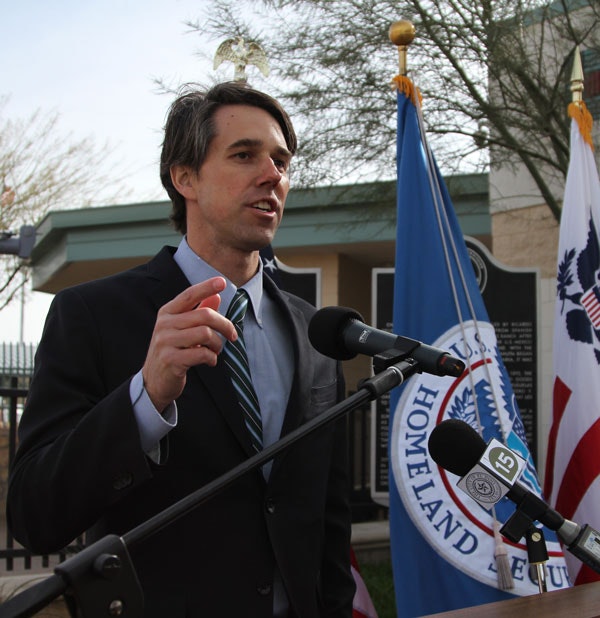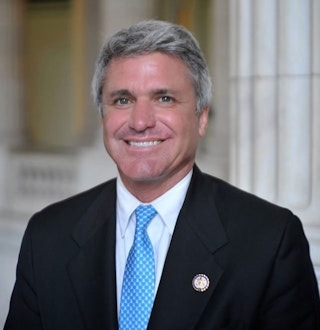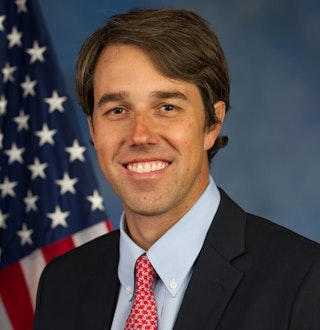Opening Trade and Securing America's Borders
Must we always disagree about border security? Think again. Republican Rep. Michael McCaul of Austin and Democratic Rep. Beto O’Rourke of El Paso find common ground on the controversial subject.
 U.S. Rep. Beto O'Rourke speaks at the kick-off ceremony of a private-public partnership at the Paso del Norte Port of Entry in El Paso, Texas, Jan. 23, 2014. (AP Photo/Juan Carlos Llorca)
U.S. Rep. Beto O'Rourke speaks at the kick-off ceremony of a private-public partnership at the Paso del Norte Port of Entry in El Paso, Texas, Jan. 23, 2014. (AP Photo/Juan Carlos Llorca)
The Catalyst asked two Texas legislators from competing political parties to discuss their views on North America’s borders. The border obviously is a hot topic and loaded with ample disagreements. While we hear plenty about those divisions, we don’t always hear where people with different points of view actually agree.
That’s not the case in this Catalyst conversation with Republican Rep. Michael McCaul of Austin and Democratic Rep. Beto O’Rourke of El Paso. Surprising points of commonalty actually appear. The conclusions of McCaul, chairman of the House Homeland Security Committee, and O’Rourke, who represents one of North America’s most important border communities, suggest that the nation can move past gridlock on an issue that affects many Americans.
The interview was conducted with the two congressmen in Washington and the Bush Institute’s Matthew Rooney and William McKenzie in Dallas. The exchange has been edited for clarity and length.
Let’s start with a broad question. What is your perception of the North American border, starting with the Texas/Mexico border? As chairman of the House Homeland Security Committee, Rep. McCaul, let’s begin with you.
McCaul: Apprehensions have gone down. We did have a little bit of a surge with unaccompanied minors from Central America. Homeland Security did a pretty good job telegraphing to these countries of origin that you are not going to be able to stay in the United States. That is why we see a lower number of apprehensions at crossings.
I look at the border not just from the issue of illegal immigration. I also look at other factors like the cartels, the violence they bring in, and, of course, El Chapo being arrested. That was significant. So was the fact that Mexico and its President pledged to extradite El Chapo to the United States. We requested this the last time he was captured. I hope they fulfill that obligation.
I’m always looking at the Southwest border from the potential counter-terrorism perspective. We have seen in ISIS’ latest magazine talk about how they could take Pakistani nuclear weapons and use transnational criminal organizations to bring them across the southwest border.
I try to not to be one of those guys that says the sky is falling. But some of these threats are concerning. We recently had two Pakistanis who were on the terrorism watch list.
“I try to not to be one of those guys that says the sky is falling. But some of these threats are concerning.”
From the Canadian border perspective, my biggest concern is the French connection to ISIS and Al Qaeda and the proximity to New York City. They could come in and get to New York or Washington D.C. That is something we constantly monitor to protect the nation from those threats.
One more thing I want to mention: We passed a transportation bill in December that has a very significant provision concerning border infrastructure projects. Texas legislators from both parties supported the measure. It takes basically 5 percent of what is collected on the border and returns the money to the border for infrastructure work. That work has been desperately needed at all ports of entry.
We will get to that bill in a minute. Congressman O’Rourke, let’s throw the question to you: What is your perception of the North American border, starting with the Texas-Mexico border?
O’Rourke: I’ll begin with agreeing with much of what the chairman said. I served on his committee for two years and found him to be aggressively vigilant against threats to the homeland. He always reminded us what was at stake, made sure we were staffed, had the appropriate technology, and focused to encounter any threats before we possibly faced it on the homeland. Also, he took a rational approach to how we use those resources and acknowledges that part of the function of the border is to facilitate legitimate trade and travel.
Mexico is the largest trading partner with Texas and so there are hundreds of thousands of jobs in our state. The Dallas Fed reports that, in the community of El Paso, one in every four jobs is connected to cross-border activity.
So, we have a lot at stake at the border, both in protecting our country and community and protecting and growing jobs. There is a dual function that we should remind our colleagues who may not be as familiar as we are with the Texas-Mexico border, who may only see it as a threat or source of anxiety.
“We have a lot at stake at the border, both in protecting our country and community and protecting and growing jobs. There is a dual function that we should remind our colleagues who may not be as familiar as we are with the Texas-Mexico border, who may only see it as a threat or source of anxiety.”
I really would like to see the country, Congress, and administration put more resources and attention toward facilitating trade and legitimate travel. In the last 10 years, we have doubled the funding for border patrol, which very well may have been necessary. We doubled the number of agents to over 20,000. There have been some very positive results, when you look at the numbers.
In 2005, the average Border Patrol agent apprehended about 106 individuals per year. In 2015, it was 17 individuals per agent. In the El Paso sector, the rate was six apprehensions per agent.
These numbers show a number of trends.
One, a step-up in enforcement is deterring immigration.
Two, the changing economic conditions that the chairman pointed out might be attracting and retaining more Mexicans in Mexico, where we have seen a net drop in migration.
Three, it allows us to add more resources and attention to the U.S. Customs and Border Protection officers. They facilitate trade at our points of entry.
We can and should do both. The United States — and Texas — are capable of deterring threats, securing our states and country, facilitating trade, and maximizing the opportunities we have with Mexico. Depending upon how you measure it, Mexico is America’s second- or third-most important trading partner and the most important trading partner for Texas.
 U.S. Rep. Michael McCaul (center) at the Anzalduas County Park along the Texas/Mexico border, Mar. 6, 2013. (AP/The Monitor, Gabe Hernandez)
U.S. Rep. Michael McCaul (center) at the Anzalduas County Park along the Texas/Mexico border, Mar. 6, 2013. (AP/The Monitor, Gabe Hernandez)
McCaul: There is a lot of talk in this election about border security. I took a delegation of about 25 members of Congress to look at the fence along the border. It is interesting how people see it as a panacea. Of course, ranchers there see the fence differently. They know people cut through it and drive over it.
I authored a bill to use technology and aviation access to achieve 100% visibility along the border. The situation is ever evolving down there, so things are never static. But I think this is really the way to go rather than a 2,000 mile wall. It’s not going to be the answer to the problem.
“I authored a bill to use technology and aviation access to achieve 100% visibility along the border. The situation is ever evolving down there, so things are never static. But I think this is really the way to go rather than a 2,000 mile wall.”
In Afghanistan, we have used hot air balloons, sister surveillance technologies, and unmanned aerial vehicles that provide visibility. They allow us to respond to the threat.
Do members of Congress who represent districts away from the border perceive the border as a security problem or as an economic benefit? Or both? Or which?
McCaul: If you live in a border state, you see it more as trade. You don’t see it as more of a threat.
O’Rourke: I agree completely. The non-border state representatives, Democrats or Republicans, tend to view the border primarily as a threat. They don’t see the opportunities for jobs.
The non-border state representatives, Democrats or Republicans, tend to view the border primarily as a threat. They don’t see the opportunities for jobs.
We have tried to help them see those opportunities, to let them know how many jobs in their home state are connected to U.S.-Mexico trade. Somewhere around 40% of the value of imports from Mexico contain U.S. components. That is unlike any country with which we trade. That figure means even when we are importing from Mexico, 40% of the value of those imports originated in Michigan and Tennessee and really every state in the union.
Another statistic that I like to share with my colleagues is that for each additional minute of delay on our ports of entry for cargo, connected to that trade, it costs the U.S. economy $166 million dollars.
That’s why it is so important to fund positions for Customs and Border Protection officers. They not only provide a security function. They also facilitate trade. As the chairman said, we need more technology and infrastructure so we can grow more U.S. jobs.
Does the U.S. Customs and Border Protection agency have the resources it needs to eliminate delays and wait times along the border?
O’Rourke: It does not and there is broad, bipartisan, and bicameral support to fix that. When we do get them, we’re going to see even greater security for Texas and our country. We also will see greater trade volumes. Mexico and the border will become more attractive for multinational and domestic investment.
 Congestion along the port of entry between El Paso, Texas and Juarez, Mexico. (Texas Department of Transportation)
Congestion along the port of entry between El Paso, Texas and Juarez, Mexico. (Texas Department of Transportation)
We hear stories from El Paso-Juarez of the unpredictability in wait time. Your cargo may be on the international bridge for 20 minutes, it may be on the bridge for four or five hours. There are extreme examples where a customs broker has had to air-freight cargo out of Juarez to the United States. When you start putting cargo on an airplane to reach its destination, versus putting it in a truck to cross a bridge, you become very uncompetitive with other parts of the border, or even with India, China, Vietnam, and other parts of the world.
“When you start putting cargo on an airplane to reach its destination, versus putting it in a truck to cross a bridge, you become very uncompetitive with other parts of the border, or even with India, China, Vietnam, and other parts of the world.”
Our advantage with Mexico is largely logistical and when we compromise that by not having the consistency for wait times, we’re really doing a disservice to the U.S. economy.
McCaul: Trade and security don’t have to be mutually exclusive. Those of us in border-states tend to see the advantages to trade. Those outside border-states see drugs, illegal immigration, potential terrorism. They don’t have the added perspective that we have of the benefits.
Is the system we use to appropriate funds for these things adequate to the task? Would you be prepared, in principle, to support some form of out-of-the-box thinking about how we finance them?
McCaul: The bill we passed in December recognized that fees being collected at the border were not going back there. That was a good vehicle for creative funding: we use fees collected at the border to support infrastructure there.
O’Rourke: We’re very open to out-of-the-box thinking for solutions. I would love to see more of that happening at the federal level rather than have local communities foot the bill. We’re willing to do so if, at the federal level, we’re not able to get these issues addressed.
But I echo Representative McCaul on this concept of returning to the border what is generated there so we can build infrastructure, generate more wealth and revenue, and pay more fees back to the federal government.
Chairman McCaul, you said, “Trade and security are not mutually exclusive.” But it seems like those often are seen as mutually exclusive. We’d like to hear your thoughts on that.
McCaul: The more secure your trading partner is, the better security you have on the border when things come in. That facilitates trade itself and often makes it safer. You know what’s coming in. So I don’t think they’re mutually exclusive. They should be able to work hand-in-hand and make it more effective.
O’Rourke: For those members of Congress and presidential candidates, and those Americans who have these concerns about the border, we need to acknowledge that it is legitimate to be concerned about drug smuggling, human trafficking, and the potential that we could have a terrorist breach at our southern border.
But then we should let people know that we are spending $18 billion a year to successfully, although not perfectly, counteract those concerns. Anyone who is rational about this will agree we will never get to 100 percent operational control, which would involve literally a shutdown of the border. I like the chairman’s idea of having 100 percent visual surveillance perhaps and have a really strong situational awareness.
The border, by some measures, has never been safer. When you look at immigration flows over a 20-year average, we’re at rock bottom, even when you count in refugees, asylum seekers, and migrants who by and large turn themselves into Border Patrol instead of trying to evade them.
“The border, by some measures, has never been safer. When you look at immigration flows over a 20-year average, we’re at rock bottom, even when you count in refugees, asylum seekers, and migrants who by and large turn themselves into Border Patrol instead of trying to evade them.”
Some of the proposals coming from Chairman McCaul, which make the best use of modern technology to complement Border Patrol agents on the ground, will add to our security. But, as he just said, we should also invest in trade facilitation and facilitation of legitimate travel for people who have documents and who are citizens of the United States.
We have a better idea of who’s coming into this country, where they’re staying, what their backgrounds are, and how long they’re supposed to stay here. I think that’s a very wise next investment that meets at face the concerns raised by several people, including presidential candidates.
This would allow us to think more strategically and effectively, to produce returns not just in security but in jobs and economic growth throughout the country and in the border states of California, New Mexico, Arizona, and Texas more than any place else.
The Catalyst believes that ideas matter. We aim to stimulate debate on the most important issues of the day, featuring a range of arguments that are constructive, high-minded, and share our core values of freedom, opportunity, accountability, and compassion. To that end, we seek out ideas that may challenge us, and the authors’ views presented here are their own; The Catalyst does not endorse any particular policy, politician, or party.


